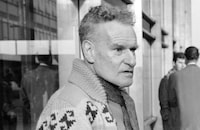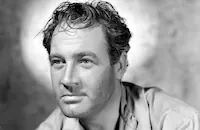Guns of Darkness

Brief Synopsis
Cast & Crew
Anthony Asquith
Leslie Caron
David Niven
David Opatoshu
James Robertson-justice
Eleanor Summerfield
Film Details
Technical Specs

Synopsis
On New Year's Eve in the Latin American state of Tribulacion, the government of President Rivera is overthrown by revolutionary military forces. Wounded, Rivera escapes and is found the next day in a state of collapse by Tom Jordan, an immature idealist whose failure to hold a job has led to marital difficulties with his wife, Claire. Jordan decides he is morally bound to help Rivera reach the border 80 miles away, and Claire reluctantly agrees to accompany them on the journey. After a number of close calls with the police, they lose their car in a lake of quicksand and are forced to proceed by foot across rocky mountain terrain. They reach the border and are captured and taken into custody. At this point Claire tells Tom that she is pregnant. Despite his abhorrence of violence, Tom kills a guard with a corkscrew in order to get himself, Claire, and Rivera across the border. Although Rivera is beyond medical help, he dies knowing that Tom now understands it is sometimes necessary to kill in order to live. Wiser and more mature, Tom is able to effect a reconciliation with Claire.

Director

Anthony Asquith
Cast

Leslie Caron

David Niven

David Opatoshu

James Robertson-justice

Eleanor Summerfield

Ian Hunter
Derek Godfrey
Richard Pearson
Sandor Eles
Steven Scott
Tutte Lemkow
Dorita Sensier
John Carson
Ali Nagi
Barry Shawzin
Peter Allenby
Crew
Stephen Birtles
Thomas Clyde
Norman Coggs
Charles Crafford
Ernie Farrer
Gerry Fisher
Benjamin Frankel
Betty Harley
Harold Haysom
George Higgins
John Howell
Jim Hydes
Ben Kadish
Robert Krasker
A. W. Lumkin
Pat Mcdermott
Anthony Mendleson
John Mortimer
Victor Peck
Len Shilton
Tommy Staples
David Tomblin
May Walding
Midge Warnes
John Watling
Frederick Wilson

Videos
Movie Clip



Film Details
Technical Specs

Articles
Guns of Darkness
Based on Francis Clifford's novel An Act of Mercy and adapted for the screen by John Mortimer (Bunny Lake Is Missing, 1965), this British suspense drama finds a married couple, played by Leslie Caron and David Niven, trapped in a fictional South American country during one such coup. Quite by accident, the couple becomes embroiled in helping the former president escape before he is caught and publicly executed. The president is played by American character actor David Opatoshu, best known around this time for his work in Alfred Hitchcock's Torn Curtain (1966) and Otto Preminger's Exodus (1960).
The novel's title was actually closer to the drama's theme, but it was likely changed to capitalize on the success of Niven's earlier film, the blockbuster war adventure The Guns of Navarone (1961), co-starring Gregory Peck and Anthony Quinn.
Caron made her first mark as a featured dancer with the Ballet des Champs-Elysees in Paris, where she was discovered by Gene Kelly and given the co-starring role in the Oscar-winning musical An American in Paris (1951). Her early successes were in musicals, among them Lili (1953) and Gigi (1958), but by this point in her career she was making the transition into more dramatic roles, notably in Joshua Logan's Fanny (1961), with Maurice Chevalier and Charles Boyer.
As the manager of a sugar plantation thrust into a deadly situation, Niven delivers a multi-faceted performance as a man with alcohol and marital problems, distinctly apolitical and apparently heedless of the feelings of others, who taps into a heroic, humanitarian side in the arduous effort to smuggle the deposed ruler across the border. Along the way, Niven regains the love and respect of his wife.
Oddly, although Niven had been in films for 30 years at this point and won a Best Actor Academy Award for his performance in Separate Tables (1958), he was given second billing to Caron on this production.
English actor Derek Godfrey was cast as a Che Guevara-like revolutionary, but for greater authenticity he was dubbed by Roger Delgado, also London born but the son of a Spanish father and French mother.
The film was directed by venerable English director Anthony Asquith (Pygmalion, 1938; The Importance of Being Earnest, 1952) and shot by Robert Krasker, the Academy Award-winning cinematographer of The Third Man (1949). Their work stands out in the film's most tense sequence as the couple's car becomes caught in a quicksand bog.
Editor Frederick Wilson must have picked up some skills here in cutting a picture for suspense. A few years later, he would receive two Academy Award nominations in a single year for the thrillers Arabesque (1966) and The Quiller Memorandum (1966).
The picture was partially shot in Malaga, Spain, standing in for the strife-torn South American country. The rest was filmed at England's Elstree Studios .
Director: Anthony Asquith
Producer: Thomas Clyde
Screenplay: John Mortimer, based on the novel An Act of Mercy by Francis Clifford
Cinematography: Robert Krasker
Editing: Frederick Wilson
Art Direction: John Howell
Music: Benjamin Frankel
Cast: Leslie Caron (Claire Jordan), David Niven (Tom Jordan), James Robertson Justice (Hugo Bryant), David Opatoshu (President Rivera), Derek Godfrey (Hernandez)
By Rob Nixon

Guns of Darkness
Guns of Darkness -
By Glenn Erickson
Guns of Darkness -
Quotes
Trivia
Notes
Copyright length: 95 min. Produced in Great Britain, with location shooting in Spain. The working title of this film is Act of Mercy.

Miscellaneous Notes
Released in United States 1962
Released in United States 1962













